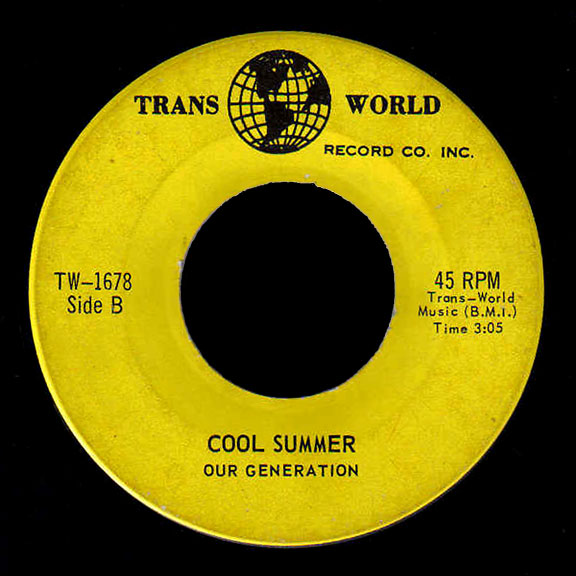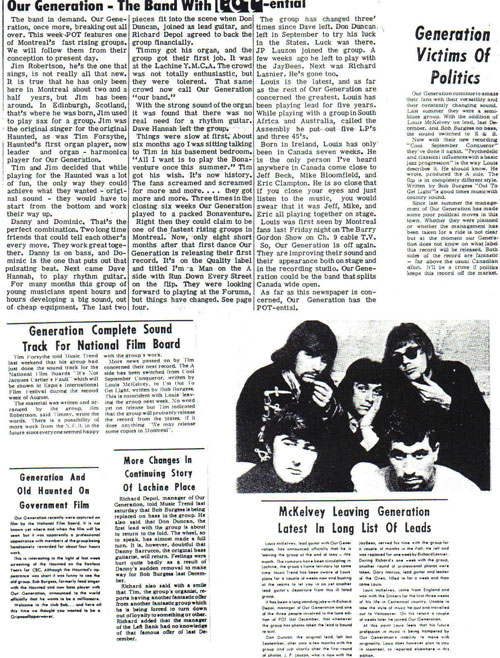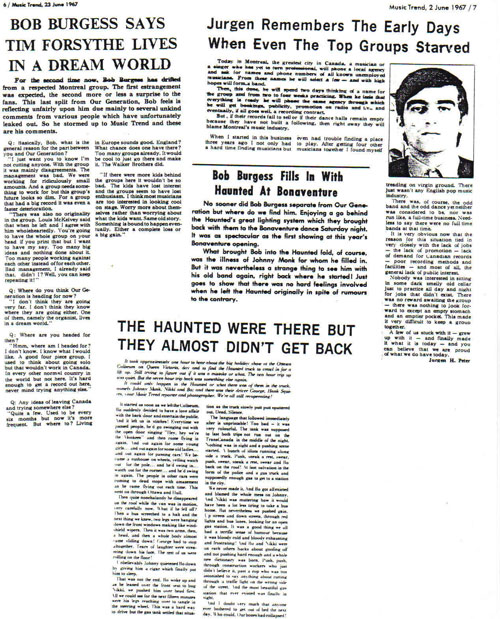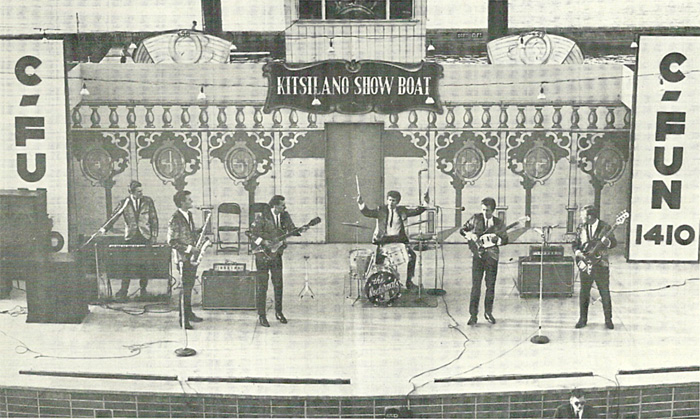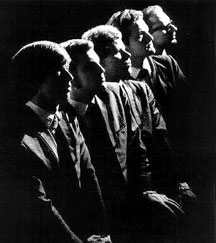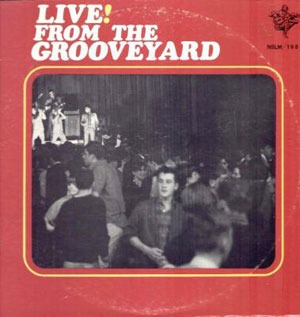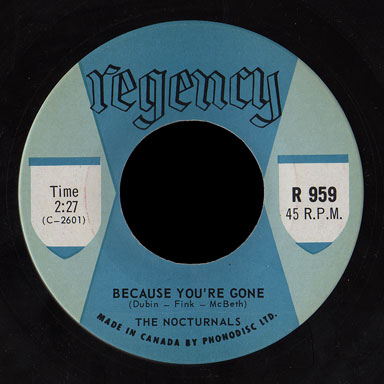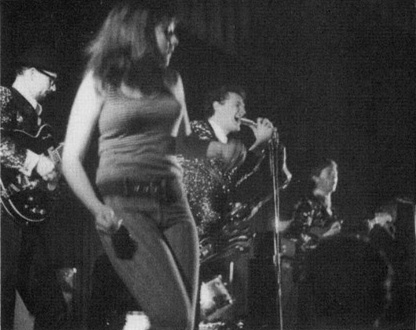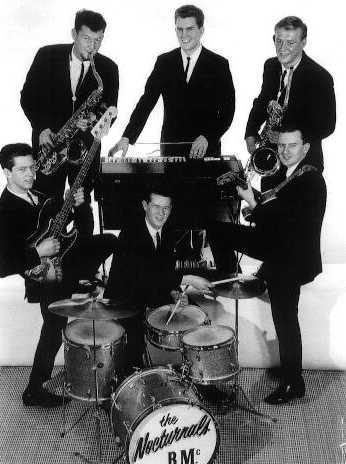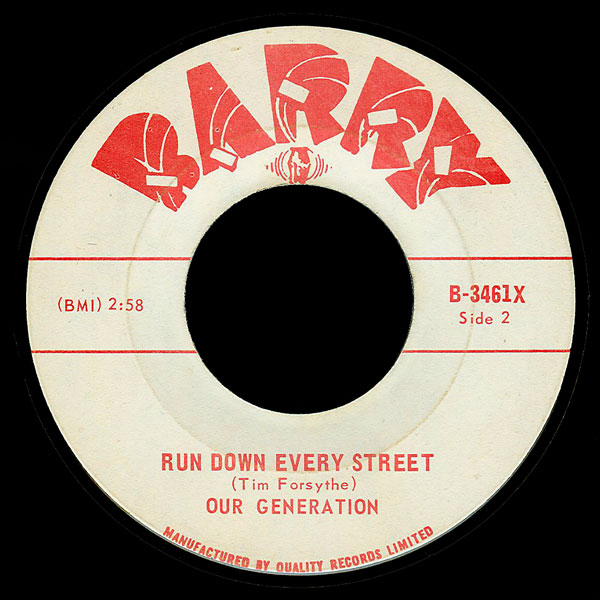
Jim Robertson (Vocals) (circa May 1966-circa July 1969)
Tim Forsythe (Keyboards, Harmonica) (circa May 1966-August 1967)
Domenic Angelicchio (Drums) (circa May 1966-circa July 1969)
Danny Barrucco (Bass) (circa May 1966-December 1966)
Dave Hanna (Guitar) (circa May 1966-July 1966)
Don Duncan (Guitar) (July 1966-September 1966, May 1967-August 1967)
Jean Pierre Lauzon (Guitar) (September 1966)
Richard Lasnier (Guitar) (circa October 1966)
Gary Marcus (Guitar) (circa October-December 1966)
Bob Burgess (Bass) (December 1966-May 1967)
Louis McKelvey (Guitar) (December 1966-May 1967)
Ken Duffy (Bass) (May 1967-circa July 1969)
Les Kozichinsky (Guitar) (August 1967-July 1968)
Don Hay (Keyboards) (August 1967-December 1967)
Jerry Carruthers (Keyboards) (December 1967-July 1968)
Dick Stenstrum (Keyboards) (July 1968-circa July 1969)
Roald Longhi (Guitar) (July 1968-circa July 1969)
The original band was formed in the summer of 1966 by former Haunted members Jim Robertson and Tim Forsythe. Robertson was originally from Edinburgh, Scotland where he’d played sax in a group during 1964 before moving to Montreal.
Based in Lachine, Quebec, the band made its debut at the local YMCA.
Hanna left soon after the band started playing live. However, the group went through a succession of lead guitarists, starting with Don Duncan, who left in September 1966, before McKelvey joined in December.
McKelvey’s arrival coincided with that of Bob Burgess from The Haunted. In between Duncan leaving and McKelvey joining, Our Generation featured temporary stopgap guitarists, J P Lauzon, who went on to The Jaybees, Richard Lasnier and Gary Marcus from Oven.
The line up with Duncan, however, was responsible for the first single, a cover of the Muddy Waters blues favourite ‘I’m a Man’, backed by Forsythe’s ‘Run Down Every Street’.
Irish-born and British raised guitarist Louis McKelvey, who had arrived in Montreal around October 1966 after playing with west London band Jeff Curtis & The Flames and later South African groups The Upsetters and The A-Cads, appeared on the band’s second single, before forming Influence in late May 1967.
Prior to joining Our Generation, McKelvey had played with Les Sinners for a few weeks and was later given co-production credit for The Haunted’s third single with fellow ex-A-Cads member Hank Squires.
This line up of Our Generation provided the soundtrack to the Canadian Film Board film, ‘It’s Not Jacques Cartier’s Fault’. McKelvey wrote ‘Cool Summer’ while Burgess composed the A-side, ‘Out to Get Light’.
Burgess left Canada in late 1967 to spend some time in the UK where he recorded, and then returned to form a new band Lilac. In the ‘70s he led Aean.
Angelicchio, Forsythe and Robertson kept the band going bringing back guitarist Don Duncan and adding new bass player Ken Duffy. This line-up lasted until August 1967 when Forsythe left to join Peter & The Pipers and Duncan moved on.
Angelicchio, Duffy and Robertson brought in keyboard player Don Hay and guitarist Les Kozichinsky for a few months. Then in December Jerry Carruthers took over keyboards from Hay.
This line-up settled and performed into the summer of 1968 before further changes.
Keyboard player Dick Stenstrum and guitarist Roald Longhi joined Jim Robertson, Dominic Angelicchio and Ken Duffy and also played Our Generation’s most significant concert date, the Summer Pop Festival held at The Autostade, Montreal on 17 July, which was headlined by The Who, The Troggs, Mitch Ryder & Detroit Wheels and The Ohio Express. The Haunted also appeared at the festival.
The band continued on for another year or so before splitting.
45 I’m A Man/Run Down Every Street (Barry 3461) 1966
45 Cool Summer/Out To Get Light (Trans World 1678) 1967
Selected advertised gigs
February 17 1967 – West Hill High, Montreal
February 18 1967 – Stanstead College, Montreal
February 24 1967 – Malcolm Campbell High, St Laurent, Quebec
February 25 1967 – The Barn (on Du Hamel)
March 3 1967 – Gig in Hudson (Quebec?)
March 4 1967 – Salle Espangnola, St Therese, Quebec
March 10 1967 – The Jail, Montreal
March 11 1967 – Gig in Huntington, Quebec
March 18 1967 – St Hubert Inn Club, St Hubert
March 25 1967 – Caveman’s Hive, Montreal
March 27 1967 – St Augustine’s NDG (Montreal?)
April 8 1967 – The Jail, Montreal
April 14 1967 – St Willabroads School (Montreal?)
April 22 1967 – St Bartholemew (Montreal?)
April 28 1967 – The Barn, Ile Perrot
April 29 1967 – Roxboro Chalet, Roxboro
May 5 1967 – Hot Spot, Rosemere
May 6 1967 – Town and Country, Cote de Liesse with Munks
May 7 1967 – Town and Country, Cote de Liesse with The Jaybees
September 24-30 1967 – Garden of Stars, Montreal
Live dates taken from the Montreal Star newspaper.
Many thanks to Bill Munson, Carny Corbett, Louis McKelvey, Bob Burgess, Ken Duffy.
Copyright © Nick Warburton. All Rights Reserved
To contact the author, email: Warchive@aol.com
Our Generation and Haunted article scans courtesy of Alex Taylor, provided by Ivan Amirault

